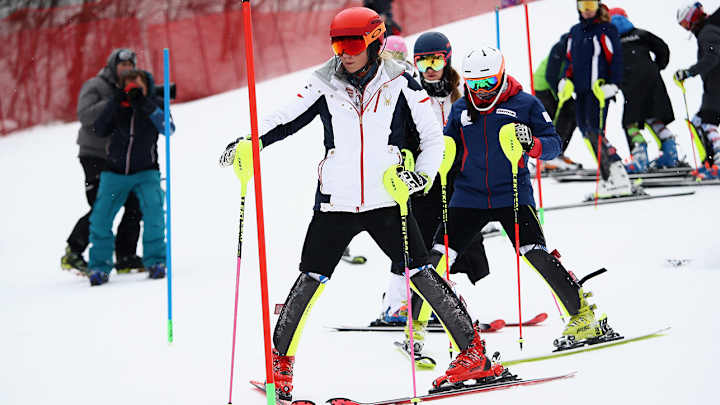Olympic Alpine Delays Could Hurt, and Help Mikaela Shiffrin

PYEONGCHANG, South Korea — Day Four of the Olympic alpine program passed Wednesday in the mountains above PyeongChang, with yet another race postponement. From the original schedule, four races were to have been contested by now, but instead there has been only one, Tuesday’s men’s alpine combined. And even in that race, variable and often gusty winds may have affected the outcome and might have cost American Ted Ligety, who finished fifth, a medal.
First the men’s downhill, originally scheduled for Sunday (Saturday night in the U.S.) was moved to Thursday (Wednesday night in the U.S.). Then Monday’s women’s giant slalom, featuring American Mikaela Shiffrin, was postponed and also moved to that same Thursday/Wednesday time slot. (The downhill will take place between runs of the giant slalom; the races are on different mountains, 25 miles apart).
On Wednesday morning here (Tuesday night in the U.S.), the women’s slalom was postponed after a delay of two hours, due to the same gusty winds that have taken up residence in these hills for the last several days, and moved to Friday, the same day as the men’s Super-G. (Same arrangement, Super-G between runs of the slalom).
"[Race officials] looked at how strong the wind is, and the visibility," said U.S. Ski Team head women’s coach Paul Kristofic, while standing near the finish line after the postponement, as winds sent nearby flags horizontal. "Also, with gusty winds like that, it’s hard to have a fair race."
The schedule now calls for two races Thursday, two races Friday and one race each on Saturday and Sunday. The good news, offered here very cautiously, is that the weather is expected to improve and seems to offer a window to knock out several races. "The wind is supposed to settle down," said Kristofic.
But more specifically, Shiffrin, who came into these Games potentially planning to race—and contend for medals—in five events—now faces three races in three days. Shiffrin’s agent, Kilian Albrecht said, "It’s super tough if you want to do multiple events, because you basically do not have a rest day.’’ By comparison, American Lindsey Vonn, who specializes in the so-called "speed" events of downhill and Super-G, will race rested—potentially against Shiffrin—in Saturday’s Super-G. It will be Vonn’s first race. This is true of many others in the speed fields, as well. Shiffrin has raced on three consecutive days three times this year, but always in a series of speed races, which is common on the circuit, not in a combination of "technical" (slalom and giant slalom) races and speed races. It will be a fresh challenge that would make success more impressive.
But there is also another side to this. The decision to not race the slalom in windy conditions benefits Shiffrin. In calm conditions, the best skier usually wins, provided she executes her best race. Shiffrin is the best skier. In windy conditions, lesser skiers can gain advantage from a sudden tailwind. While not speaking about Shiffrin specifically, Kristofic, who does not work directly with Shiffrin (or Vonn, as both have their own coaching staff), said, ``A fair race is what you want. If you run in unstable conditions, it can go in your favor or it can go against you."
Shiffrin’s team obviously favors a race in stable conditions, as do all the top racers. They don’t want their medals stolen by an outlier with a hurricane at her back. "There was no chance at all for a fair race [Wednesday in Korea]," said Albrecht.
Ninety minutes after the postponement, Shiffrin said, in a statement released by Albrecht, "It is definitely unfortunate that we weren’t able to race today, but it is important we have a fair race for all of the athletes and today’s conditions would definitely not have been fair. Weather delays and postponements are just the nature of an outdoor sport, but we’ll continue to take it day by day and I look forward to getting in the start gate!"
Olympic weather delays are hardly unprecedented. Twenty years ago in Nagano there were just three races contested in the first seven days of the alpine program at the Games, and then seven races in the last five days. There were three days with two races.
Also: Ski racers are accustomed to this. Their lives have been dictated by weather since they were children, up to and including racing on the World Cup circuit. "Always a little bummer when a day like this happens," said Kristofic. "But we’re quite used to it."
